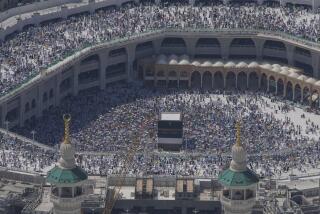Egypt calls for calm as church bombing toll rises to 25
- Share via
Reporting from Cairo and Beirut — The New Year’s Day bombing of a church in the northern coastal city of Alexandria sparked calls for calm Sunday as Egyptian security officials scrambled to find suspects and the death toll rose to 25, according to a statement issued Sunday by the nation’s Coptic Orthodox Church.
Dozens more were injured in the blast, which occurred just minutes into the New Year and sparked clashes Saturday in Alexandria between police and Coptic Christians.
Authorities struggled to prevent any escalation of tensions between minority Christians and Muslims, who make up about 90% of the country. Minister of Information Anas Fikki issued a statement calling on television channels to avoid provocative commentary about the attack and “avoid delving into topics that could ignite sedition.”
The Coptic Church’s statement called the attack “a grave escalation” of violence against Christians and “a result of the current sectarian tensions between Muslims and Copts that recently erupted due to the spread of lies about the church and its symbols.”
Copts demanded a transparent and public investigation into the attack and called on authorities to release details about the crime as soon as possible.
Egyptian authorities said they had detained at least 17 people Sunday on suspicion of involvement in the attack. Ten were released, but seven remained in custody, according to the state-run Al Ahram newspaper and website.
Extra police were deployed outside churches in Cairo and Alexandria, and cars were barred from parking nearby, Al Ahram reported. The bomb used in the attack was “locally made,” and the triggerman “was killed in the bombing,” the paper reported, citing an unnamed official. Officials did not clear up contradictory reports on whether the explosive device was in a car or worn by a suicide bomber.
A prosecutor said the investigation had yet to yield a clear picture of how the bombing was plotted and carried out. Many of the injured were being interviewed as witnesses, the prosecutor said.
Diaa Rashwan, a researcher on Islamic movements at the Al Ahram Center for Political and Strategic Studies, said the attack would make Christians feel less secure. “So, surely an incident like this can escalate current sectarian tensions across the nation.”
The bombing bore the trademark of religiously inspired Al Qaeda-style attacks. Rashwan said the attack was probably carried out by Egyptians. “While Al Qaeda has no presence in Egypt, this is a new method that has Al Qaeda’s features.”
Meanwhile, the nation mourned those who perished in the attack, the deadliest on the country’s dwindling Christian population in a decade and the nation’s worst terrorist attack in more than four years.
In Alexandria, Copts returned to church en masse for a Sunday service marked by an outpouring of grief for lost friends and family. A number of Copts told cleaning personnel not to pick up any of the body parts or bits of flesh scattered across the church, telling them to “leave everything as it is; this is pure and virtuous Coptic blood.”
Nearly 5,000 Copts took part late Saturday in a burial ceremony at a monastery about 18 miles from Alexandria after a day of clashes between security forces and Christians.
Small protests also broke out in the southern city of Assiut, which were dispersed quickly by security forces. “We are not going to remain silent,” they chanted. “The hearts of the Copts are on fire.”
In the capital, Cairo, and Alexandria, hundreds of Christians and Muslims took part in a demonstration Sunday to condemn the bombing, with calls of: “A Muslim and a Copt hand in hand to create a new dawn,” and “Not a police state, not a religious state, we want Egypt to be a secular state.”
The public shows of interfaith solidarity included politicians and civil-society activists who carried banners depicting the crescent along with the cross, a historical symbol of unity between Egyptian Muslims and Copts.
In Cairo’s Shubra district, one of the few areas of the capital where large communities of Copts live alongside Muslims, police swiftly surrounded protesters to prevent any clashes.
During the march, activists distributed fliers calling on Copts to boycott work for three days and to make Jan. 7, when Copts celebrate Christmas, a day of mourning.
The bombing drew widespread condemnation across the Middle East, including from Islamist political groups such as Hamas in the Palestinian territories and Hezbollah in Lebanon.
It was the latest in a series of violent attacks in the Muslim world targeting Christian communities, already shrinking because of emigration.
Special correspondent Hassan reported from Cairo and Times staff writer Daragahi from Beirut.
More to Read
Sign up for Essential California
The most important California stories and recommendations in your inbox every morning.
You may occasionally receive promotional content from the Los Angeles Times.









